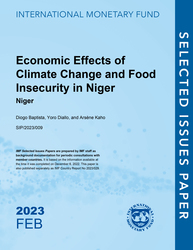
Economic Effects of Climate Change and Food Insecurity in Niger: Niger
Niger’s exposure to recurrent shocks, including climate shocks, increases its vulnerability to food insecurity.
READ MORE...
Volume/Issue:
Volume 2023
Issue 009
Publication date: February 2023
ISBN: 9798400234279
$15.00
Add to Cart by clicking price of the language and format you'd like to purchase
Available Languages and Formats
| English |
Prices in red indicate formats that are not yet available but are forthcoming.
Topics covered in this book
This title contains information about the following subjects.
Click on a subject if you would like to see other titles with the same subjects.
Economics- Macroeconomics , Money and Monetary Policy , International - Economics , Environmental Economics , Climate Change , Food Insecurity , General Equilibrium Model , Niger , Niger's exposure , mitigation policy response , cash transfer , food goods , equilibrium goods price , utility function , factory gate , consumption requirement , food consumption , consumption bundle Cit , calorie consumption kcalit , iceberg trade cost , cost imports , Consumption , Food security , Income , Sub-Saharan Africa , Global
Summary
Niger’s exposure to recurrent shocks, including climate shocks, increases its vulnerability to food insecurity. This paper aims to quantify the combined effects of climate shocks and food insecurity on key economic variables and identify the most effective mitigation policy responses using a general equilibrium model. Results indicate that rural households would be the most affected by a climate shock resulting in a decline in domestic agricultural production, which would reduce their consumption, erode their capital, and thus increase urban-rural inequalities. Simulations show that cash transfers and the reduction of internal mobility costs appear to be more effective in mitigating the impact on households of a climate shock on agricultural production.
Copyright © 2010 - 2026
Powered by:
AIDC



